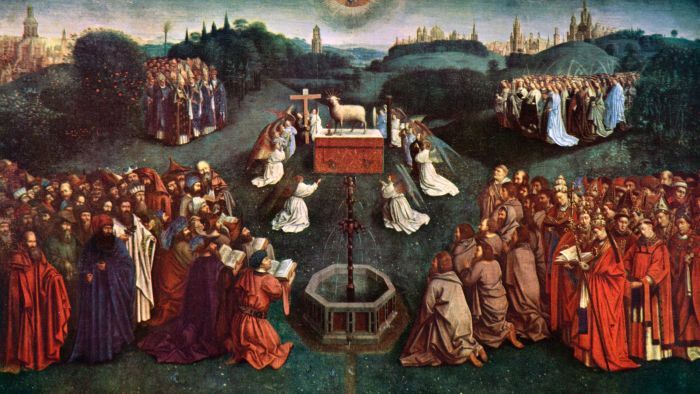[fbshare type=”button” float=”right” width=”100″] By Lawrence Feingold

It is proper to spousal love that there be a mutual and total self-giving of the partners to each other, as St. Paul says in Ephesians 5:25–27: “Husbands, love your wives, as Christ loved the church and gave himself up for her, that he might sanctify her, having cleansed her by the washing of water with the word, that he might present the church to himself in splendor, without spot or wrinkle or any such thing, that she might be holy and without blemish.”
In the Eucharist, Christ gives to His Bride the very act by which He poured out His life for her to cleanse and sanctify her by meriting the remission of sins. That sacrifice of infinite love is also the act most pleasing to the Father that is conceivable.
In other words, Christ willed to give a testament to His Bride that would be not only His own living presence but also the continued presence of the very act by which He showed Himself as the Supreme Lover of our souls. Of course, His whole life was a continual manifestation of love for us: He became flesh for love of us. However, the full extent of that love was revealed only in His suffering and death on the Cross, offered for our redemption. And so, He left to His loved ones a perfect token of His love, giving to us, sacramentally, the very act by which He died for our sins. This is the Eucharist.
In the Mass, Christ offers Himself, Victim of Love, in the very act of pouring Himself out in sacrifice for us. In the words of Pope Benedict XVI, Jesus left us the Eucharist so that we could forever enter into “His hour”: “The Eucharist draws us into Jesus’s act of self-oblation. More than just statically receiving the incarnate Logos, we enter into the very dynamic of his self-giving.”
Through the Eucharist, therefore, Christ not only nourishes His Bride with affective love through Communion but also teaches effective love by giving us His supreme sacrifice of His love to be our sacrifice. In the Eucharist, we are given the incomprehensible gift of being able to give God the Son to God the Father for the forgiveness of sins and for every blessing.
Finally, spousal love seeks not only to dwell with the beloved and sacrifice oneself for the beloved, but, through self-sacrifice, to enter into the most intimate union with the beloved. The Eucharist makes possible this most intimate union through Holy Communion. Furthermore, this spousal union in the Eucharist is realized in a way fitting for human beings, for it is both physical and spiritual, like spousal love. Receiving Communion enables us to take Christ bodily into ourselves, to join with Him in a close physical way. He can then remain with us for about ten minutes, until the sacred species are corrupted by the digestive process. However, the more important union is the enduring spiritual effect of the Eucharist by which sanctifying grace, charity, and the Indwelling of the Trinity is nourished and increased.
As a necessary consequence of our union with Christ, the Eucharist also deepens our communion with one another in the Mystical Body in fraternal charity, and thus it is the sacrament of ecclesial unity. St. Paul states this in 1 Corinthians 10:17: “For we, being many, are one bread, one body, all that partake of one bread.” The Eucharist binds us into one Body by strengthening our unity with Christ and with one another.
Dr. Lawrence Feingold is Associate Professor of Theology and Philosophy at Kenrick-Glennon Seminary in St. Louis. He is the author of numerous scholarly books, including The Eucharist: Mystery of Presence, Sacrifice, and Communion, a comprehensive commentary on the mystery of the Eucharist drawing from Scripture, the Church Fathers, and magisterial teaching throughout the ages.

